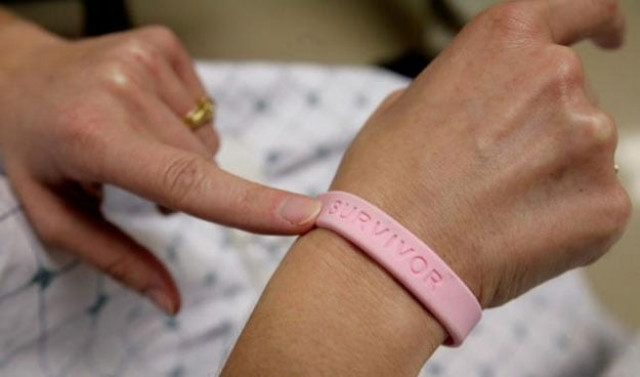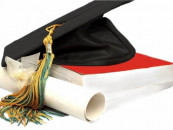Diagnosis & prevention: Experts call for countrywide cancer database
Say Pakistani women are at highest risk of breast cancer in Asia

A cancer patient shows off her breast cancer survivor bracelet
PHOTO: REUTERS
“In Pakistan, one out of every nine women gets breast cancer at some stage of her life,” Pink Ribbon CEO Umer Aftab said on Friday while talking about rapid increase in cases of breast cancer in Pakistan.
He said several studies and reports suggested that among the Asian population, Pakistani women have the highest risk of breast cancer.
“Low intake of fruit and vegetable, lack of physical activity, use of tobacco, alcohol and processed foods are the major cause of cancer,” he added. “Our dairy producers use steroids to increase their products, so can how we save our future generation from this menace.”
He demanded of the government to take the issue seriously and initiate a nationwide registration campaign for cancer patients.
World Cancer Day is marked on February 4 all over the world to raise awareness about cancer and to encourage its prevention, detection and treatment. The day was founded by the Union for International Cancer Control (UICC) to support the goals of the World Cancer Declaration, written in 2008. The theme for the 2017 is “We can. I can”.
According to Rescue 1122 District Emergency Officer Dr Abid Channar, cancer is becoming one of the leading causes of death in Pakistan. “Lungs, prostate, colorectal, stomach and liver cancer are the most common types of cancer in men, while breast, colorectal, lungs, uterine cervix and stomach cancer are the most common among women,” he explained. “More than 30% of cancer deaths can be prevented by modifying or avoiding key risk factors, especially tobacco use.”
Explaining the World Health Organisation’s (WHO) measures to keep a check on cancer, Dr Channar said early detection, accurate diagnosis, and effective treatment, including pain relief and palliative care, help increase cancer survival rates and reduce suffering. He said the WHO has launched the Global Action Plan for the Prevention and Control of cancer 2013-2020 that aims to reduce premature mortality from cancers by 25%. Nevertheless, healthy lifestyles, balanced diet, regular physical activity, weight management along with refraining from smoking and alcohol can definitely reduce the risk of occurrence of cancers globally.
In his message on World Cancer Day, Punjab Chief Minister Shehbaz Sharif said the government had taken steps for timely diagnosis and provision of free medicines for deserving cancer patients. He said that not only the cancer patients suffer but their families also face a lot of difficulties.
“Those providing ray of hope to cancer patients are rendering incredible service to humanity,” Shehbaz remarked.
Published in The Express Tribune, February 4th, 2017.



















COMMENTS
Comments are moderated and generally will be posted if they are on-topic and not abusive.
For more information, please see our Comments FAQ